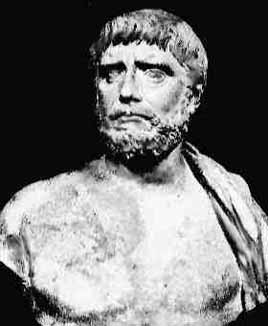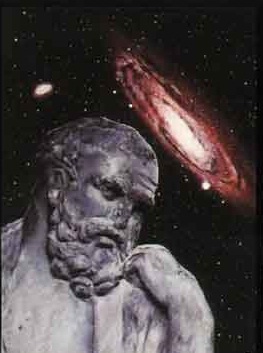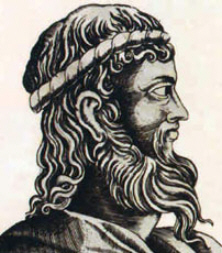Melisian School
The first Pre-Socratic philosophers were from Miletus on the western cost of Anatolia. Also referred as the early Ionian philosophers.
Thales

The first philosopher in history of ancient Greece, in the cradle of Westhern philosophy was a man by name of Thales of Miletus (c. 640-546 B.C). He was one of the legendary Seven Wise Men of Ancient Greece. These "wise men" were not only thinkers, but doers, not only theoreticians, but practical men of the world. Thales knew next to nothing, but it is expressly stated that it was only late in life that he took to philosophy, andthat he was also involved in commerce, enginnering, geometry and astronamy (he is said to have predicted en eclise, which must have been the one in 585 B.C).
Thales believes that the primary element of reality is water. He said that everything comes from water. The world id nourished by water. Through his crude account of the nature of water, he had explained that water is a substance that is capable of the other elements in different conditions, e.g., condensed (frozen) and expanded (loosened). He took a naturalistic explanation of the way he view reality. Download
Anaximander

Thales was followed by other philosophers who advanced different theories as to the basic structure of matter. Thus the philosopher Anaximander (c.610-545 B.C.) is said to have come from Samos, Ionia, where the famous Pythagoras also lived. He is said to have written about nature, the fixed stars, the earth's sphere and other matters. He produced something like a map, showing the boundary of land and sea, and was responsible for a number of mathematical inventions, including a sun dial and an astronomical chart.
The really real, which perdures through every transformation and underlies the primary qualities, must be wholly indeterminate and must of itself lack all qualities. It is the Indeterminate, the Unlimited, the Apeiron. According to Diogenes, "He adduced the apeiron (the indeterminate, boundless, infinite, indefinite) as the principle of reality or the basic element; he neither determined it as water, air or any such tangible thing." (Hegel, History of Philosophy, Vol. one, p.185.) And again, "It is the principle of all becoming and passing away; at long intervals infinite worlds or gods rise out of it, and again they pass away into the same."
Anaximander worked out that man and all other animals had developed from a fish, which abandoned water for the land. Two thousand (2,000) years before Darwin, Anaximander anticipated the theory of evolution, with his amazing discoveries in marine biology. Download
Anaximenes

The last of the great trio of Ionian materialist was Anaxemenes (c.582-528 B.C.). He is said to have been born when Thales “flourished,” and to have “flourished” when Thales died. He was younger than Anaximander, and following Thales, he took a single element -“air”- as the absolute substance, from which everything comes forth and to which everything is ultimately reduced. In fact, Anaximenes’ use of the word “air” (aer) differs substantially from the modern usage. It includes vapor, mist and even darkness. Some translators prefer the word “mist.”
At first sight, the idea represents a step back in comparison to the position of matter in general arrived at by Anaximander. In fact, his worldview was a step forward. Anaximenes attempted to show how “air,” the universal substance, becomes transformed through a process of what he called rarefaction (loosening) and condensation (packing). When it is rarefied, it becomes fire, when condensed, wind. By further condensation, we get clouds, water, earth and stones. But although in details his view of the universe compares unfavorably with that of Anaximander (he thought the world was shaped like a table, for instance), nevertheless, his philosophy represented an advance, inasmuch as he tried to move beyond a general statement of the nature of matter. He attempted to give it a more precise determination, not only qualitatively, but quantitative, through the process of rarefaction and condensation. Download